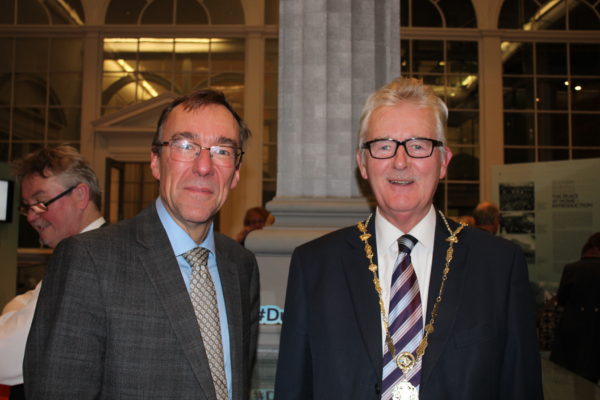
The first annual UNESCO City of Literature lecture took place on Thursday evening in the Dublin City Archive and Library on Pearse St. The inaugural lecture centred on the literature that shapes our city, revealing the stories that live among the streets we walk and the characters that accompany us on them.
Chris Morash, the College’s Vice-Provost with a background as a lecturer in English, was the evening’s speaker. Though he talked with an almost manic speed, it quickly became evident that was because he had so much to say. He brimmed with enthusiasm, announcing at the outset that “I want to take you for a walk around the mind of Dublin”.
Within the hour, he had certainly achieved that task and the city’s psyche lay bare before the audience. Through thorough evaluations of literary works set in and concerning Dublin – Morash spent over 15 minutes on a single Ulysses passage – from authors including James Joyce, Thomas Kinsella, Louis MacNeice, Samuel Beckett, Roddy Doyle and Christina Lally, Morash utilised the voices of these Irish authors to reveal the special place literature has in defining and shaping a city.
Literature also acts as a reflective tool, he stressed. In the words of MacNeice, it allows us to stand back from the dynamic flux, flow and change, and just for a moment, reflect or “poise” at the “toppling hour”. In a work of literature time stands still, and Dublin, its customs and its people, can be observed for a moment without them threatening to morph into something else. The cityscape constantly changes around us. The elements that make up our city can seem static but really buildings are flattened and erected and the crowds that fill the city change day in and day out. The city has its moments of reprise when snapshots of it in time are immortalised on the page.
Morash argued that when living in Dublin, one is haunted by the memories of Dublin’s past but also overwhelmed by the changing of its present. Morash feels that the tension between these two states is ultimately what defines our experiences with the city. We live with one foot in and one foot out of Dublin’s grave. In the conference room, I was the only student there, aside from a photographer, and it struck me as a pity that more students weren’t also in attendance to enjoy this free talk. It may be library season and time is tight, but I do not regret taking an hour out to listen some very interesting theories regarding our home. The talk was followed by free canapes and alcohol, and attending free events like this is a no-brainer and part of the privilege of living in a culturally rich city.
Morash’s words stayed with me on my walk back towards College along Pearse St, the city in my mind’s eye erecting itself differently. The buses roared past in the late evening streams of traffic and Beckett’s phrase, “tumult of buses”, stirred around in my brain. What a succinct way to sum up their overbearing presence.






